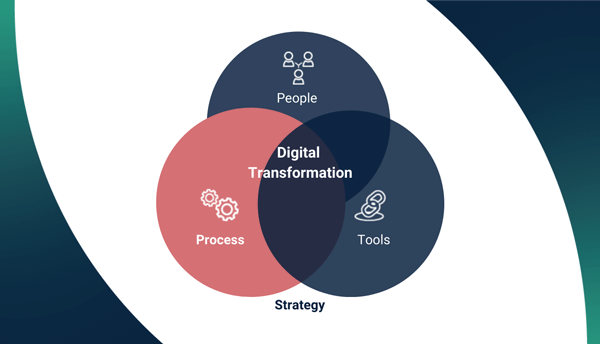Who led Digital Transformation within your Organisation?
A: COVID-19
B: Chief Technology Officer (CTO) or
C: Chief Executive Officer (CEO)
Introducing Cindy Londt, Operations Executive at Omni HR Consulting
Operations, I would say is the heart of the organisation in terms of engaging with learners and clients. As a Private FET College, our focus being in education and business to business consulting, really what I do is look after the part of the organisation that implements the activities that are aligned to client and learner engagement and consists of multiple different departments.
Q: Can you give us a bit of an overview/makeup of Operations, specifically those who would be affected by Digital Transformation?
CL: I think that the two areas most affected that support the overall Operations in terms of Digital Transformation would be our client engagement which was very much around business to business consulting as well as project implementation for organisations around skills development initiatives.
Aligned to the business component is, obviously, the learners that sit within those learning components. Our Learning and Development Practitioners that would typically do classroom face-to-face training would be most impacted by the need for them to shift; how they do learning, how they do coaching and learner support and how we make sure from a risk and compliance perspective we still maintain the quality assurance aligned to assessments and moderation practices within our space.
Q: If I could backtrack you to pre COVID-19, it would be safe to say that Omni was not impacted by remote operations. From your perspective what is the type of processes, systems and procedures that has been put in place that has prepared the entire team to operate and continue post-COVID?
CL: From a Digital Transformation Strategy perspective, for us, it was around how we manage and lead a national team for implementing projects. If we go back to the organisation [Omni] in terms of what we stand for, it really was around saying: how do we ensure customer centricity through everything we do. In order to achieve that we need to have a team that is quite agile in terms of being able to shift and move.
From a workforce perspective, our team needed to be able to do their jobs, because at the end of the day they are the face of our brand. As part of our DTS in operations, we had started with our first phase of the process about 18-months ago when we looked at streamlining our overall processes and procedures. As we operate nationally, it required resources to make sure that everything we do is consistent in terms of how we engage with both learners and clients. Ultimately, it was around the customer experience and making sure that everything we were doing aligns ourselves to the quality and compliance within the Private FET College space.
DTS thus took on two-folds: looking at the tools that supported the activities of our staff and how do we make sure that they are able to implement projects effectively. This aligned itself very much to project management tools that allowed for large-scale implementation of projects and our workforce management tools, not for micromanaging individuals but it really was about being able to have a platform to engage with our staff.
The second component was around client engagement and the tools we were using for ease of engaging with clients and that resulted in a Client Relationship Management system to be able to track and better be able to support and engage with individuals through Sales and Marketing platforms and then the other one was the launch of our e-learning platform.
In a nutshell, it really was about streamlining processes and ensuring that we would be able to support both our learners and our clients.
Q: 18-months on, what would your comments be regarding the team’s willingness (or not) and ability to embrace the Digital Transformation change?
CL: Change is always broken into two different spectrums: you have those individuals that are very comfortable with change and are quite excited with new tools, new technology, and new ways of doing things; so, they naturally embrace it. Then there are those who take a step back because there is a technology component “I don’t like technology and I don’t know how to use it” and there is just that adversity to change in general.
I think as a team we needed to go through that process. There were early adopters and were comfortable and then those who dug their heels in a little bit more. At the end of the day, we were quite lucky as a team as we had a good mixture and we were able to move the team forward. I think the impact right now has been less; because we are in constant change and flux all the time as we move and shift and change to the needs of our clients and learners.
Q: Since COVID-19 and the extended lockdown, is there a shift in the attitude from the people [towards Digital Transformation]?
CL: We have always had a saying “anything is possible” and it really is around “what are we doing next?” There was a natural feel of, this is another big change. The team has been working slowly and steadily towards a more drastic shift in terms of online learning and what that looks like.
The actual willingness and desire of the team to move very quickly in terms of evolving into the new space has been good. Again, there are those who have shifted quickly and those that have gone a bit slower but overall, in general, we have been successful in shifting the team.
Q: People are still going to work remotely for some time. What would you say are some of the significant changes that you can attest to that has allowed Omni to add value to customers in the area of learning and skills development strategies?
CL: What we have found in moving Omni to more virtual online platforms, is that a lot of the times we have been ready but organisations (businesses) are not necessarily assured that their organisations are ready. A success factor for us is that we have been able to have a lot of engaging conversations with clients because DTS and COVID-19 have forced them to shift into a more digital way of learning. It has allowed us to start shifting our clients thought processes around online learning and virtual classrooms.
The ETDP landscape as its is didn’t necessarily support virtual and online learning and so again, conversations with our SETA’s have been a lot more fruitful in them being willing to and wanting to collaborate with skills development providers who have the e-Learning platforms.
Q: Any closing remarks you would like to share pertaining to your people (within Operations) and Digital Transformation still currently happening?
CL: We have used this time as a unique opportunity to expedite a lot of the strategies that Operations did have from a Digital Transformation perspective. It has been an exciting time for us, it’s challenging, and we are uncertain of when we are going to see the inside of a classroom again, but it has been phenomenal to see how the people and the organisation have really just jumped onto it.
We can recognise the challenges and we can recognise the concerns, but it goes back to “anything is possible.”
Contributor: Cindy Londt, Operations Executive, Omni HR Consulting


















